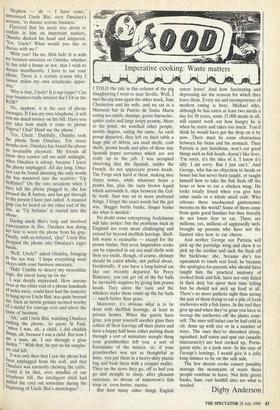Imperative cooking: Waste matters - it ,:•,'
I TOLD the tale in this column of the pig slaughtering I went to near Seville. Well, I met the pig man again the other week, Sam Chesterton and his wife, and we sat in a Mariscos bar in Puerto de Santa Maria eating sea snails, shrimps, goose barnacles, spider crabs and large stripy prawns. More to the point, we watched other people, mostly dagoes, eating the same. As each group departed, they left on their table a huge pile of debris, sea snail shells, crab shells, prawn heads and piles of those tiny Spanish paper serviettes which are not really up to the job. I was occupied observing that the Spanish, unlike the French, do not appreciate prawn heads. The Frogs suck hard at them, making nice slurpy noises, while whatever brain a prawn has, plus the tasty brown liquid which surrounds it, slips between the Gal- lic teeth. Sam was on to more profound things. I forget the exact words but the gist was, 'Bugger bottle banks, bisque banks are what is needed.'
No doubt some enterprising Andalusian will take notice: but the problems back in England are even more challenging and extend far beyond shellfish leavings. Shell- fish waste is excusable — except for the prawn brains. Not even Imperative cooks can be expected to eat sea snail shells with their sea snails, though, of course, shrimps should be eaten whole, not pulled about. Incidentally, if you have a long-haired cat like our recently departed Sir Percy Blakeney, you can get rid of the fur balls he inevitably acquires by giving him prawn heads. They adore the taste and the whiskers make them vomit up the fur balls — much better than grass.
Moreover, it's obvious what is to be done with shellfish leavings, at least in private homes. When the guests have gone, you pour yourself another glass then collect all their leavings off their plates and have a happy half hour either putting them through a sort of miniature mangle thing your grandmother left you, a sort of forerunner of the mincer, or, if your grandmother was not as thoughtful as mine, you put them in a heavy-duty plastic bag and bash them with a croquet mallet. Then on the stove they go, off to bed you go and straight to sleep, after pleasant exercises, to dream of tomorrow's fish soup or, even better, risotto.
But how many other things English
eaters leave! And how fascinating and depressing are the reasons for which they leave them. Every sin and incompetence of modern eating is here. Michael who, although he has eaten at least two meals a day for 50 years, some 35,000 meals in all, still cannot work out how hungry he is when he starts and takes too much. You'd think he would have got the drop on it by now. There must be some obstruction between his brain and his stomach. Then Patricia is just fastidious, won't eat good things such as fish heads, doesn't like liver, `I'm sorry, it's the idea of it. I know it's silly. I am sorry. But I just can't.' And George, who has no objection to heads or bones but has never been taught, or taught himself how to take the fish flesh off the bone or how to cut a chicken wing. He looks totally foxed when you give him some snails or a whole small crab. Who releases these uneducated gastronomic morons on the world? Some of them come from quite good families but they literally do not know how to eat. There are millions, yes, millions of supposedly well- brought up persons who have not the faintest idea how to cut cheese.
And neither George nor Patricia will pick up the partridge wing and chew it or pick up the sardine and suck the flesh off the backbone: she, because she's too squeamish to touch real food; he because the apologies-for-parents who should have taught him the practical anatomy of cooked birds and fish, have not only failed in their duty but spent their time telling him he should not pick up food at all.
There's no more pathetic sight than seeing the pair of them trying to eat a pile of fresh anchovies with a fish knive. In the end they give up and when they've gone you have to recoup the anchovies off the plates your- self. The ones still intact can be had cold in oil, done up with rice or in a number of ways. The ones they've shooshed about, squashed, half eaten and spat out (usually inaccurately) are best cooked up, Portu- guese style, in a pork stew. In the case of George's leavings, I would give it a jolly long simmer to be on the safe side.
The few decent cooks cannot possibly manage the mountains of waste these people combine to leave. Not little green banks, Sam, vast landfill sites are what is needed.
Digby Anderson


















































 Previous page
Previous page